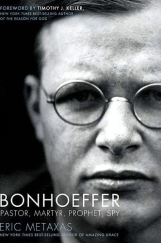From “Bonhoeffer: Pastor, Prophet, Martyr, Spy” | On Authority & Leadership
Posted: 12.31.2011 | Author: treylow | Filed under: Book: Bonhoeffer | Tags: Book: Bonhoeffer, chancellor of germany, dietrich bonhoeffer, eric metaxas, legitimate authority, treaty of versailles, true leadership |4 Comments Two days after Hitler became the democratically elected chancellor of Germany, Dietrich Bonhoeffer gave a radio address on the topic of “The Fuhrer Principle” – the idea of a Leader who answers to no one. His speech was titled “The Younger Generation’s Altered Concept of Leadership.” Before he could finish the address, the program was pulled from the air. Many believe this was the work of Hitler himself, though this cannot be confirmed.
Two days after Hitler became the democratically elected chancellor of Germany, Dietrich Bonhoeffer gave a radio address on the topic of “The Fuhrer Principle” – the idea of a Leader who answers to no one. His speech was titled “The Younger Generation’s Altered Concept of Leadership.” Before he could finish the address, the program was pulled from the air. Many believe this was the work of Hitler himself, though this cannot be confirmed.
From Eric Metaxas’ summary of Bonhoeffer’s speech:
“The German notion of the Fuhrer arose out of this generation and its search for meaning and guidance out of its troubles [WWI & The Treaty of Versailles]. The difference between real leadership and the false leadership of the Leader [Fuhrer] was this: real leadership derived its authority from God, the source of all goodness. Thus parents have legitimate authority because they are submitted to the legitimate authority of a good God. But the authority of the Fuhrer was submitted to nothing. It was self-derived and autocratic, and therefore had a messianic aspect.”
From Bonhoeffer on true leadership:
“…if he does not continually tell his followers quite clearly of the limited nature of his task and of their own responsibility, if he allows himself to surrender to the wishes of his followers, who would always make him their idol – then the image of the Leader will pass over into the image of the mis-leader, and he will be acting in a criminal way…The true Leader must always be able to disillusion…He must lead his following away from the authority of his person to the recognition of the real authority of orders and offices…He must radically refuse to become the appeal, the idol, i.e. the ultimate authority of those whom he leads.”
“Only when a man sees that office is a penultimate authority in the face of an ultimate, indescribable authority, in the face of the authority of God, has the real situation been reached…Alone before God, man becomes what he is, free and committed in responsibility at the same time…Leaders or offices which set themselves up as gods mock God and the individual who stands alone before him, and must perish.”
My takeaway:
There is a lot to learn from Bonhoeffer’s treatise on authority and leadership. Here are three things I think we can learn:
- Ultimate Authority Rests with God: Any attempt to lay claim to ultimate authority – be it human, ideological, or other – is seditious and treasonous in nature. Though Bonhoeffer witnessed this ever-so-clearly in the person of Hitler, we too witness idols (that we set up in our hearts) that we believe will ultimately satisfy us with whatever they offer. These idols are dangerous and will not be as explicit as Hitler in their messianic agendas.
- The Leader is Never Greater than the Mission: In other words, leaders point their followers toward mission not position. Though Hitler did everything in the name of a “better Germany,” it was all a ruse to acquire more power and to mystify the people with his cunning and leadership. Bonhoeffer’s point, however, is that the leader is never greater than the mission. The leader should always be humbly training the next generation to take his place. Otherwise, the focus is on the person not the mission.*
- Know Your Limits: Both in ability and by that which is legislated. Once in power, Hitler set up a government that could not restrict his sovereignty. He ruled swiftly and supremely. Therefore, he had no legislated limits to recognize…not that this was a good thing! However, he had plenty of personal limits which he should have recognized publicly but did not. As leaders we ought to know our strengths and weaknesses, and defer, when necessary, to those we trust who are strong where we are weak. Likewise, if the jurisdiction of our position is limited, we ought to respect our boundaries and work prudently within the scope of our given role. We can be informed and critical of other offices but we cannot be imperialistic.
*An absolute ruler who does not train the next generation is no better than having no leader to train the next generation. This expression of mis-leadership is evidenced all throughout the book of Judges in the phrase, “In those days there was no king of Israel. Everyone did what was right in his own eyes.” (Judges 21:25)
Metaxas, Eric. “Chapter 9.” Bonhoeffer: Pastor, Martyr, Prophet, Spy : a Righteous Gentile vs. the Third Reich. Nashville: Thomas Nelson, 2010. 141-42. Print.


I’ve been working through this book as well and am loving it. Good takeaways. Miss you, brother.
I was wondering if you’d read it! Let’s get real nerdy when we both finish it, and compare notes.
Pop would have enjoyed reading this blog from the German perspective.
Dad
Would’ve been great to have gotten his thoughts!